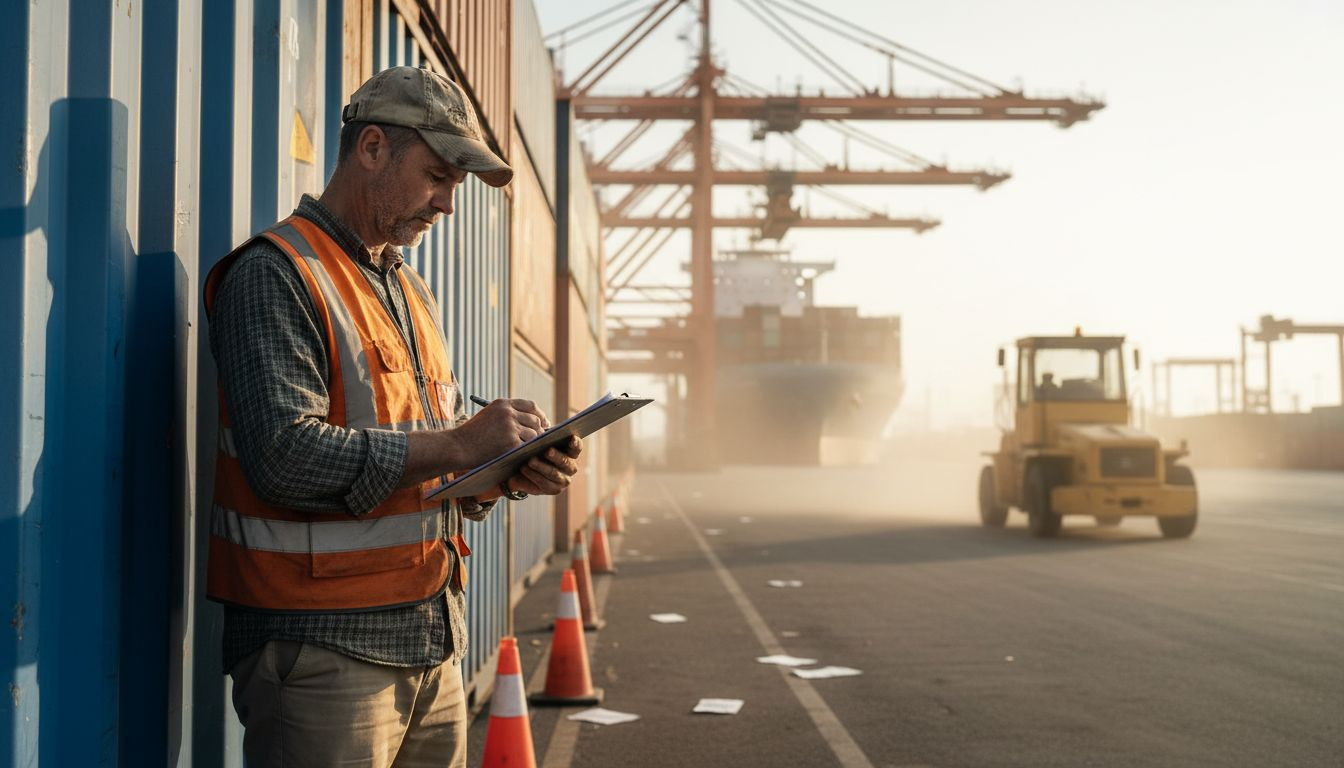Every international shipment hinges on a single document. The customs invoice is trusted by governments across the globe to police trillions of dollars in cross-border trade every year. That sounds routine and bureaucratic at first. But almost 98% of global shipments are held up or denied entry if this paperwork is incomplete or wrong. Here is what most companies completely overlook. A well-prepared customs invoice is not just paperwork. It is your fastest route to avoiding delays, dodging fines, and building frictionless global partnerships.
Table of Contents
- Defining Customs Invoice And Its Importance
- Key Elements Of A Customs Invoice
- The Role Of Customs Invoicing In Trade Compliance
- Regional Variations In Customs Invoice Requirements
- Best Practices For Preparing Customs Invoices
Quick Summary
| Takeaway | Explanation |
|---|---|
| Customs invoices detail trade transactions. | They provide specific information required for assessing duties, taxes, and compliance with regulations in international trade. |
| Accuracy reduces risks in trade. | Mistakes in customs invoices can lead to shipment delays, penalties, and legal issues, emphasizing the importance of precise documentation. |
| Regional variations exist in requirements. | Different countries have unique customs invoice standards, necessitating businesses to tailor documentation for compliance in each market. |
| Digital strategies improve invoicing efficiency. | Utilizing technology such as automated systems and electronic submissions streamlines the preparation and improves accuracy of customs invoices. |
| Continuous improvement in compliance is crucial. | Regular audits, staff training, and updated protocols help businesses manage customs invoice requirements effectively, reducing the risk of non-compliance. |
Defining Customs Invoice and Its Importance
A customs invoice represents a critical document in international trade that serves multiple essential functions beyond a standard commercial invoice. Unlike regular invoices that simply record a transaction, customs invoices provide detailed information specifically required by government authorities to assess import duties, taxes, and ensure regulatory compliance.
What is a Customs Invoice?
A customs invoice is an official document that provides comprehensive details about goods being imported or exported across international borders. Learn more about international trade documentation to understand how these documents interconnect. The invoice typically includes critical information such as:
- Exact description of goods
- Precise quantity and weight
- Total value of the shipment
- Country of origin
- Harmonized System (HS) product codes
- Seller and buyer details
- Shipping terms and conditions
Why Are Customs Invoices Critical for Trade?
Customs invoices play a pivotal role in international commerce by enabling customs authorities to:
- Determine accurate duties and taxes
- Verify product classifications
- Ensure compliance with import/export regulations
- Track international trade statistics
- Prevent potential fraudulent trade activities
According to World Trade Organization research, approximately 98% of international shipments require a properly completed customs invoice to clear customs procedures. Businesses that fail to provide accurate and complete customs invoices risk significant delays, financial penalties, and potential legal complications.
The primary goal of a customs invoice is to provide transparent, verifiable information about goods in transit. By mandating detailed documentation, governments can effectively manage trade flows, protect domestic industries, and maintain accurate economic records. For businesses engaged in international trade, understanding and meticulously preparing customs invoice requirements is not just a regulatory obligation but a strategic necessity for smooth, efficient global operations.
Key Elements of a Customs Invoice
Compiling a comprehensive customs invoice requires meticulous attention to specific details that enable smooth international trade transactions. Explore essential freight terminology to better understand the context of these critical documents.
Essential Identifying Information
A robust customs invoice must include precise identifying information about the transaction and the parties involved. This section must clearly articulate details that help customs authorities verify the legitimacy and accuracy of the shipment. Critical identifying elements include:
- Exporter and importer complete legal names and addresses
- Tax identification or registration numbers
- Detailed contact information for both parties
- Unique invoice number and date of issuance
- Specific shipping and delivery references
Comprehensive Product Description
The product description represents the most scrutinized section of a customs invoice.
 According to International Chamber of Commerce guidelines, the description must be extraordinarily precise and include:
According to International Chamber of Commerce guidelines, the description must be extraordinarily precise and include:
- Exact product name and technical specifications
- Harmonized System (HS) classification code
- Quantity and units of measurement
- Detailed material composition
- Country of origin manufacturing details
- Commercial value per unit and total shipment value
Financial and Regulatory Documentation
Customs invoices serve as more than transactional records.
They function as critical financial and regulatory documents that enable governments to assess appropriate duties, taxes, and compliance standards. Key financial elements include transparent pricing information, declared value calculations, applicable trade agreements, and specific terms of sale. Businesses must ensure these documents reflect exact monetary values and adhere to international trade regulations, as even minor discrepancies can result in significant delays or potential legal complications during customs clearance processes.
The Role of Customs Invoicing in Trade Compliance
Customs invoicing serves as a fundamental mechanism for ensuring regulatory adherence and transparency in international trade transactions. Learn more about importer responsibilities to comprehend the broader context of trade compliance.
Regulatory Verification and Control
Customs invoices function as critical instruments for government authorities to validate and monitor international trade activities. These documents enable regulatory agencies to:
- Confirm the accurate classification of imported goods
- Verify declared product values
- Assess appropriate import duties and taxes
- Track potential trade restrictions or embargoes
- Prevent potential fraudulent trade practices
Financial Transparency and Risk Management
Beyond regulatory oversight, customs invoices play a pivotal role in financial risk management for both governments and businesses. According to World Customs Organization research, detailed invoicing helps mitigate several key financial risks:
- Preventing undervaluation of goods
- Detecting potential money laundering activities
- Ensuring accurate revenue collection
- Supporting economic statistical reporting
- Facilitating fair international trade competition
Compliance and Legal Framework
Customs invoicing represents more than a bureaucratic requirement. It is a critical legal instrument that establishes a transparent record of international transactions. Businesses must meticulously prepare these documents to demonstrate full compliance with complex international trade regulations. Inaccurate or incomplete invoices can result in significant penalties, shipment delays, and potential legal challenges. The precision and comprehensiveness of customs invoices directly impact a company’s ability to maintain smooth, efficient cross-border trade operations.
Below is a table summarizing the key required elements found in a typical customs invoice, designed to provide a quick reference for preparing compliant documentation.
| Element | Description |
|---|---|
| Exporter and Importer Details | Legal names, addresses, tax IDs, and contact information of both parties |
| Invoice Number and Date | Unique identifier for the invoice and its date of issuance |
| Product Description | Exact product name, technical details, material composition, and manufacturing country |
| HS Code | Harmonized System code for product classification |
| Quantity and Units | Exact amount and unit of measurement for each product |
| Value of Goods | Per unit value and total shipment value, including currency |
| Shipping Terms and Delivery References | Agreed upon shipping terms (like Incoterms) and relevant logistics details |
Regional Variations in Customs Invoice Requirements
International trade involves navigating a complex landscape of diverse customs regulations that vary significantly across different countries and regions. Explore global trade terminology to better comprehend these intricate differences.
North American and European Union Standards
North American and European Union countries have developed relatively standardized customs invoice requirements that prioritize detailed documentation and digital compliance. According to World Trade Organization research, these regions typically require:
- Comprehensive product classification codes
- Detailed commercial invoice information
- Electronic submission capabilities
- Standardized data elements across different trade platforms
- Multilingual documentation support
Asian and Developing Markets Complexity
Customs invoice requirements in Asian and developing markets present more nuanced challenges, with significant variations in documentation standards and regulatory frameworks. These regions often have:
- More manual processing of documentation
- Higher emphasis on physical document verification
- Varying levels of digital infrastructure
- More complex bureaucratic approval processes
- Region-specific additional documentation requirements
Strategic Compliance Considerations
Navigating regional customs invoice variations demands strategic preparation and adaptability. Businesses must recognize that a single, uniform approach cannot address the diverse regulatory landscapes. Successful international traders invest in understanding specific regional requirements, maintaining flexible documentation processes, and developing robust compliance mechanisms that can quickly adapt to different national standards. The ability to precisely tailor customs invoices to specific regional regulations represents a critical competitive advantage in global trade operations.
The following table compares regional customs invoice requirements, helping businesses understand key differences and compliance challenges across major international markets.
| Region | Standardization Level | Documentation Methods | Key Compliance Challenges |
|---|---|---|---|
| North America | High | Electronic preferred | Multilingual, detailed data, digital focus |
| European Union | High | Electronic preferred | Standardized formats, multilingual docs |
| Asia | Varies (medium to low) | Often manual, some digital | Physical verification, complex bureaucracy |
| Developing Markets | Low | Primarily manual | Extra documents, less digital integration |

Best Practices for Preparing Customs Invoices
Creating accurate and compliant customs invoices requires a strategic approach that minimizes risks and ensures smooth international trade transactions. Learn more about export shipping documentation to enhance your understanding of comprehensive trade preparation.
Comprehensive and Accurate Documentation
Precision is paramount when preparing customs invoices. According to International Chamber of Commerce guidelines, businesses must meticulously document every aspect of their international shipments. Key considerations include:
- Providing exact product descriptions
- Including precise harmonized system (HS) codes
- Verifying complete seller and buyer information
- Documenting accurate weight and quantity measurements
- Calculating precise commercial values
Digital Compliance and Technology Integration
Modern customs invoice preparation leverages advanced technological solutions to enhance accuracy and efficiency. Successful international traders are increasingly adopting digital strategies that:
- Implement automated documentation systems
- Utilize standardized digital templates
- Integrate real-time compliance checking mechanisms
- Enable electronic submission capabilities
- Support multilingual documentation requirements
Risk Management and Continuous Improvement
Customs invoice preparation is not a static process but a dynamic approach to international trade compliance. Strategic businesses continuously refine their documentation practices by:
- Regularly updating internal compliance protocols
- Training staff on current regulatory changes
- Conducting periodic internal audits
- Maintaining detailed record-keeping systems
- Developing robust error correction mechanisms
Successful customs invoice preparation transcends mere bureaucratic requirement. It represents a critical strategic capability that directly impacts a company’s ability to conduct efficient, compliant international trade operations.
Take Control of Customs Compliance with Worldwide Express
Confused or frustrated by complex customs invoice requirements? Many companies struggle with precise documentation, risk costly delays, or worry about compliance mistakes that can stop shipments at the border. If your goal is smooth, worry-free international shipping, you need a reliable, experienced partner committed to your success. Learn how Worldwide Express, Inc. solves these challenges with tailored customs support, advanced compliance tools, and first-hand global expertise. For more insights, view our Uncategorized solutions page.

Ready to simplify your trade documentation and keep your goods moving worldwide without stress? Trust our team to handle your customs invoices, clearance, and end-to-end logistics. Discover streamlined shipping now at Worldwide Express, Inc. and experience cross-border efficiency today.
Frequently Asked Questions
What is a customs invoice?
A customs invoice is an official document that provides detailed information about goods being imported or exported, including descriptions, quantities, values, and other critical trade data required by customs authorities.
Why is a customs invoice important for international trade?
Customs invoices are essential because they help customs authorities determine duties and taxes, verify product classifications, ensure regulatory compliance, and prevent fraud in international trade.
What key elements should be included in a customs invoice?
A customs invoice should include the exporter’s and importer’s details, a comprehensive product description, harmonized system (HS) codes, quantities, values, country of origin, and any applicable financial information related to the transaction.
How can businesses ensure compliance with customs invoice requirements?
Businesses can ensure compliance by meticulously preparing customs invoices with accurate details, utilizing digital documentation solutions, continuously updating their processes, and training staff on current trade regulations.
Recommended
- How to Pay Customs Duties: A Step-by-Step Guide – Worldwide Express, Inc.
- Understanding What is Customs Valuation for Trade – Worldwide Express, Inc.
- Understanding Inco Terms: Key Concepts for Global Trade – Worldwide Express, Inc.
- What is the Bill of Entry? Understanding Its Importance – Worldwide Express, Inc.






